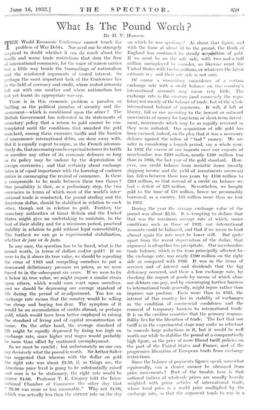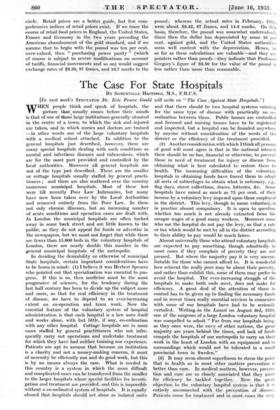What Is The Pound Worth ?
By H. V. HODSON.
THE World Economic Conference cannot touch the problem of War Debts. Nor need one be strangely sceptical to doubt whether it can do much about the tariffs and worse trade restrictions that dam the flow of international commerce, for the voice of reason carries but a little way beside the trumpetings of nationalism and the reinforced arguments of vested interest. So perhaps the most important task of the Conference lies in the field of currency and credit, where vested interests fall out with one another and where nationalism has not yet learnt its appropriate war-cry: There is in this economic problem a paradox as baffling as the political paradox of security and dis- armament—which is conditional upon the other ? The British Government has reiterated in its statements of monetary policy that a return to gold cannot be con- templated until the conditions that smashed the gold standard, among them excessive tariffs and the burden of uneconomic international debts, are done away with. But it is equally cogent to argue, as the French adaman- finely do, that no country can be expected to lower its tariffs or sacrifice any other of its economic defences so long as its policy may be undone by the depreciation of foreign currencies ; and that certainty_ about exchange rates is of equal importance with the lowering of customs duties in .encouraging the revival of commerce. Is there a compromi4e. to be made between these two theses ? One possibility is that, as a preliminary step, the two currencies. in terms of which most of the world's inter- national trade is conducted, the pound sterling and the American. dollar, should be stabilized in relation to each other, though not in .relation to gold. Further, the monetary authorities of Great Britain and the United States might give an undertaking to maintain, to the best of their ability and for a minimum period, practical stability in relation to gold without legal-convertibility. The furthest. we can go is experimental stabilization,- whether de jure or de facto. • In any case, the question has to be faced, what is the pound worth, in terms of dollars and/or gold? If we were to fix it above its true value, we should be repeating the error of 1925 and compelling ourselves to put a downward deflationary pressure on prices, as we were forced to in the subsequent six years. If we were to fix it below its true value, we might impose a similar strain upon others, which would soon react upon ourselves, and we should be depressing our average standard of life during the period of re-adjustment. Too low an exchange rate means that the country would be selling too cheap and buying too dear. The symptom of it would be an accumulation of credits abroad, or perhaps gold, which would have been better employed in raising the standard of living and of capital reconstruction at home. On the other hand, the average standard of life might- be equally depressed by fixing too high an exchange rate, since higher real wages would probably be more than offset by continued unemployment.
So we must be careful ; but unfortunately no one can say decisively what the pound is worth. Sir Arthur Salter has suggested that whereas with the dollar on gold the right rate was about $3.50, if, as things are, the American price level is going to be substantially raised and ours is to be stationary, the right rate would be nearer $4.00. Professor T. E. Gregory told the Inter- national Chamber of Commerce the other day that " $3.50 was more or less reasonable." Why not $4.00, which was actually less than the current rate on the clay on which he was speaking ? At about that figure, and with the franc at about 85 to the pound, the Bank of England has continued its steady acquisition of gold. If we must be on the safe side, with two and a half million unemployed to consider, so likewise must the United States with twelve millions, or whatever the latest estimate is ; and their safe side is not ours.
Of course a momentary coincidence of a certain exchange rate with a credit balance on the country's international accounts may mean very little. The exchange rate is the creature (and conversely the regu- lator) not merely of-the balance of trade. but of the whole international balance of payments. It will, if left at liberty, fall or rise according to the inward or outward movements of money for long-term or short-term invest- ment, movements which may be as rapidly reversed as they were initiated. Our acquisition of idle gold has been excused, indeed, on the plea that it was a necessary defence against the inflow of " bad " money. We are safer in considering a longish period, say a whole year. In 1932 the excess of our imports over our exports of merchandise was £289 million, nearly £100 million less than in 1930, the last year of the gold standard. How- ever, our credit balance from invisible items (mostly shipping income and the yield of investments overseas) has fallen between those two years by £150 million to £264 million, so that instead of a credit on balance we had a deficit of £25 million. Nevertheless, we bought gold to the tune of £18 million, hence we presumably borrowed, as a country, VS million more than we lent in 1982.
During the year the average exchange value of the pound was about $3.50. It is tempting to deduce that' that was the maximum average rate at which, under conditions such as those of 1932, our international accounts could be balanced, and that if we mean to lend abroad again the rate must be lower still. But quite apart from the recent depreciation of the dollar, that argument is altogether too precipitate. Our merchandise trade ,balance, which is the item principally affected by the exchange rate, was nearly £100 million on the right side as compared with 1930. It was in the items of services and of interest and dividends that the big deficiency occurred, and there a low exchange rate, by checking the import of goods by means of which alone our debtors can pay, and by encouraging further barriers to international trade generally, might injure rather than improve our position. Even more than in 1925, the interest of this country lies in stability of exchanges' as the condition of commercial confidence and the removal of temporary harriers to international trade.
It is on the creditor countries that the primary respons- ibility lies for the liberation of trade. The fact that our tariff is in the experimental stage•may make us reluctant to concede large reductions in it, but it would be well worth our 'while to stabilize the pound at a comparatively high figure, as the price of more liberal tariff policies on the part of the United States and France, and of the progressive liberation of European trade from exchange restrictions.
Since the balance of payments figures speak somewhat equivocally, can a clearer answer be obtained from price movements ? Part of the trouble here is that national indices of wholesale prices are usually heavily weighted with prime articles of international trade, whose local price is a world price multiplied by the exchange rate, so that the argument tends to run in a circle. Retail prices are a better guide, but few com- prehensive indices of retail prices exist. If we trace the course of retail food prices in England, the United States, France and Germany, in the two years preceding the American abandonment of the gold standard, and if we assume that to begin with the pound was ten per cent. over-valued, then " purchasing power parity " (which - of course is subject to severe modifications on account of tariffs, financial movements and so on) would suggest exchange rates of $8.50, 97 francs, and 16.7 marks to the pound; whereas the actual rates in February, 19a3, were about $3.42, 87 francs, and 14.3 marks. On this basis, therefore, the pound was somewhat undervalued. Since then the dollar has_ depreciated by some 18 per cent. against gold, and the United States authorities seem well content with the depreciation. Hence, in so far as these calculations are valuable—and they are pointers rather than proofs—they indicate that Professor Gregory's figure of $3.50 for the value of the pound is less rather than more than reasonable.











































 Previous page
Previous page